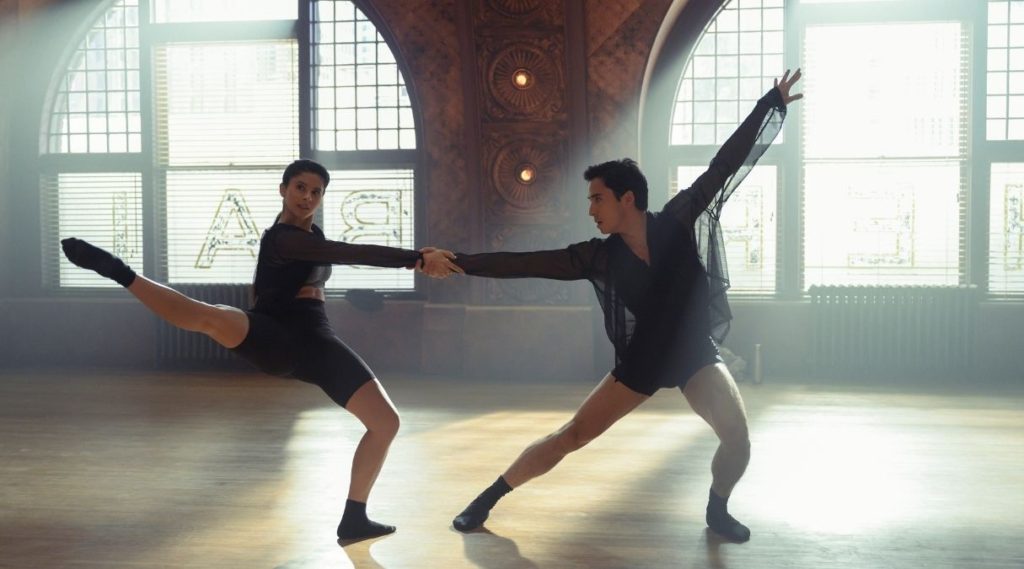Content Warning: Tiny Pretty Things involves themes of sexual assault and eating disorders
I am a sucker for messy teen dramas that take every single trope, transgression, and dark life lesson and throws it at the audience. It’s why I’ve seen every episode of Pretty Little Liars and why my teen years were obsessed with The OC and One Tree Hill. Throw in the messy teen drama formula with the competitive world of ballet and to be honest you have a recipe for disaster. But only in the lives of the teenage characters, for the audience, you get a ride you don’t want to get off of even with all the emotional whiplash that twists throw you. That’s what you get in the Netflix Original series Tiny Pretty Things.
Michael MacLennan serves as writer, showrunner, and executive producer on Tiny Pretty Things, which is based on the book by Dhonielle Clayton and Sona Charaipotra. The new series is set in the world of an elite ballet academy and charts the rise and fall of young adults who live far from their homes, each standing on the verge of greatness or ruin. As Chicago’s only elite dance school, the Archer School of Ballet serves as the company school for the city’s renowned professional company: City Works Ballet. The Archer School is an oasis for an array of dancers: rich and poor, from north and south, and a range of backgrounds. Yet they all share a rare talent and passion for dance, a loyal sense of community, and a competitive push to reach their dreams.
Over the course of this 10-episode season, we watch as the prima ballerinas of the Archer compete and form relationships all in the wake of the accident that leaves the school’s star dancer, Cassie (Anna Maiche), in a coma. Entering the academy to take her place and serve as a distraction to the press is Neveah Stroyer, a teen from California with big dreams and a traumatic past. Surrounded by privileged students, Neveah stands out. As she attempts to find her place in the school and in the new ballet, Ripper, commissioned by the school by a famous choreographer, Naveah has to navigate racism, classism, and the standard catty teenage jealousy that takes a dangerous edge. And she does it all while being reminded at every corner that someone in the academy attempted to kill Cassie.
Kylie Jefferson who plays Neveah is excellent on-screen. She holds her own in scenes with the older actors and the writing behind her character is interesting. Granted we only have a couple of episodes dedicated to an exploration of the secrets of her past, when we do see them explored Jefferson brings emotion to the character that is palpable. Additionally, her tenacity and resiliency with what feels like the entire academy against her are well written and well-acted.
The cast around Neveah is pleasantly diverse. While each of them plays into certain stereotypes their differences help create drama in the series and show that the series itself attempts to tell a story from a perspective we don’t often see ballet, specifically that from people of color. Nabil (Michael Hsu Rosen) is Cassie’s former boyfriend and a devout Muslim who must balance the assumption of his classmates and the xenophobic aggressions from his roommate. The roommate in question is Caleb (Damon J. Gillespie), equipped with a Southern accent and from a military family, he serves as the most rigid and prejudiced of the group, an interesting take for a Black character.
June (Daniela Norman) is the daughter being pushed by her mother to greatness, and while she rises through struggle and deals with larger issues of abuse at an institutional level, she is pushed into the traditional stereotype for Asian characters, a child not fulfilling their “tiger mom’s” goals. With all that said, while Tiny Pretty Things prominently features people of color in its narrative it doesn’t make discussions of race the focus, and the involvement of people’s identities is always to showcase how they’re being exploited or being mistreated.
While the above characters exhibit stereotypes, so do the white characters. Bette (Casimere Jollette) is the spoiled mean girl, coming from privilege and using it to fuel her push for success. Shane (Brennan Clost) is one of the only out gay characters and he is continually having to carry the insecurities of the men he is with. And then this is Oren (Barton Cowperthwaite). While Oren presents the typical mean jock trope, he also adds a different element: body image.
In how it presents its characters, Tiny Pretty Things doesn’t break convention, but it also doesn’t use the stereotypes it portrays to a detrimental effect. The stereotypes are balanced against small nuances that while they happen in passing, still happen. For example, Nabil and his faith are revealed to be very personal and not familial, breaking the assumptions of both the audience and his roommate. Caleb may begin as a bigoted teen who believes that Nabil is his enemy just for his faith, but we learn more about his trauma, and it kind of makes sense – although not excusing his behavior.
Beyond their stereotypes and tropes, the cast of Tiny Pretty Things are great actors and each of them holds their own in scenes and for at least me, they execute phenomenal dances that showcase their physicality as well. Additionally, while no character is particularly strong on their own when they interact with each other and we get to see their relationships highlighted they dance off the screen. The narrative threads of the series that explore how people have tied themselves to others are where it shines.
To its credit, Tiny Pretty Things doesn’t shy away from hard conversations. In fact, the subject matter is intense for the majority of the 10 episodes. Themes of sexual assault, eating disorders, bullying, queer identity, race, and religious identity are woven throughout the series but none of them are particularly explored in great detail. They do get attention, but they serve as brief moments versus the overarching themes which ultimately means they exist to add drama – which given the genre the series falls into makes it par for the course and not necessarily something to be critiqued so much as something that viewers should know so that they don’t come in with high expectations.

Additionally, the series features a lot of sex, and not just sex between men and women. This may not seem like a big deal, but sex between both the male and female characters and between same-sex couples are treated equally. They both show the same amount of skin, they both are shown as the typical “sexy” and more intimate, and sexual experiences are openly discussed regardless of the character’s sexual identity. This is something that is different from most teen dramas which largely focus on straight relationships, or treat same-sex relationships as something not to be shown on television especially in teen-centric shows.
But one stride that Tiny Pretty Things makes is something that most could have seen coming from a show about ballerinas: eating disorders. I’ve written about my own experiences with an eating disorder which I struggled with for the majority of my life, and when it comes to representing them on television it’s pretty standard. Thin white women are the face of eating disorders which reinforces assumptions of who is allowed to seek help. This means women of color and men in general struggle to seek help because they are not seen as those who can suffer from the disorder. To its credit, by centering this theme around a male character, and in fact one of the most hypermasculine characters you get a different exploration of anorexia and bulimic tendencies that we don’t see in popular media.
Instead of bones, the character is focused on muscles. Thinness translates to strength instead of the nothingness that we often see equated to perfection in the representations of women with the disorder like in Netflix’s To the Bone. While there isn’t a huge exploration of anorexia in the series, we do see the character exhibit ritualistic behavior, destructive behaviors, and we are shown his friends learning the signs of relapsing into the disorder. This can serve as a vital exploration for some who have never seen a man with an eating disorder or those who hold the assumption that only women can live with it.
Finally, Tiny Pretty Things is messy. The narrative features twists and turns that make Pretty Little Liars seem tame and it dully embraces the eccentricities that this genre of television has become known for. The double-crosses, the cheating, the competition, and the relationships forged and broken make for a thrilling watch that will be perfect for binge-watchers. The messy narrative that calls you to pay attention and the problems the characters find themselves in will leave you questioning their ages, but once you suspend that disbelief, the series is quite fun.
There is a moment where a character who isn’t studying at The Archer responds to news of an arrest by yelling “who are you people?” That moment is pretty much the entire experience of watching these teenagers drink, scheme, do drugs, have sex, and ultimately fight for dominance in the world of dance. There is nothing tame about Tiny Pretty Things, and while it’s sure to not be everyone’s cup of tea, if you’re into the genre of messy teen drama then this is one you can’t miss. The mess, the intrigue, all of it exists to keep you hooked, and honestly, I can’t wait to see a season two if the series is renewed.
Tiny Pretty Things is available for streaming on Netflix.
Tiny Pretty Things
-
Rating - 6.5/106.5/10
TL;DR
Tiny Pretty Things is messy. The narrative features twists and turns that make Pretty Little Liars seem tame and it dully embraces the eccentricities that this genre of television has become known for. The double-crosses, the cheating, the competition, and the relationships forged and broken make for a thrilling watch that will be perfect for binge-watchers.





